Unraveling the Truth: Do Calming Collars Really Work for Dogs?
As a pet owner, you want the best for your furry friend, especially when it comes to their emotional well-being. With dog anxiety being a prevalent issue, calming collars have emerged as a popular solution. But, do calming collars really work for dogs? In this blog post, we’ll delve into the science behind calming collars, explore their effectiveness, and provide guidance on choosing and using these innovative products. So, sit back and get ready to discover if calming collars could be the answer to your dog’s anxiety woes.
Key Takeaways
- A dog calming collar can offer a range of benefits for reducing canine anxiety, with pheromone-based and combination collars being the most effective.
- Experts are optimistic about calming collar potential to reduce dog anxiety. Individual needs should be taken into account with advice from a vet or animal behaviorist.
- Pet owners have seen positive results in their dogs’ behavior after using calming collars properly and fitting them correctly.
The Science Behind Calming Collars

A calming dog collar is a wearable device for dogs that typically contains synthetic pheromones designed to help your furry friend relax during stressful situations. These collars work by mimicking the natural, comforting pheromones released by a mother dog when nursing her pups. Through this, they provide a sense of security and can aid in reducing anxiety triggered by events like thunderstorms, fireworks, or new environments.
Calming collars rely on two main mechanisms to help reduce anxiety in dogs: dog appeasing pheromones (DAP) and essential oils. Both of these components aim to create a sense of calm and relaxation in our furry friends, and their combination in the best calming collars has shown promising results in managing dog anxiety.
But what exactly are these pheromones and essential oils, and how do they contribute to a dog’s sense of well-being?
Dog Appeasing Pheromones
Dog appeasing pheromone, or DAP, is a synthetic version of the naturally occurring calming pheromones released by mother dogs to soothe their puppies, mimicking the effects of mother dog’s pheromones. Pheromone collars, such as the Adaptil collar, contain these beneficial synthetic pheromones, providing a calming effect for dogs in various situations, including thunderstorms, car rides, and veterinary visits.
Research has shown that exposure to pheromones can help dogs feel more relaxed in stressful environments, such as veterinary hospitals, and during simulated thunderstorms. The effectiveness of pheromone collars, however, may vary depending on the individual dog’s temperament and the specific cause of their anxiety.
Essential Oil Collars
Essential oil aromatherapy collars use aromatherapy to create a soothing and peaceful effect for dogs. These collars typically contain calming essential oils such as lavender and chamomile, which are known to have relaxing effects on both humans and dogs.
While essential oil collars may provide some relief for anxious dogs, their effectiveness is less scientifically proven compared to pheromone collars. Nonetheless, many pet parents have experienced positive results when using essential oil collars to manage their dog’s anxiety.
Types of Calming Collars and Their Effectiveness
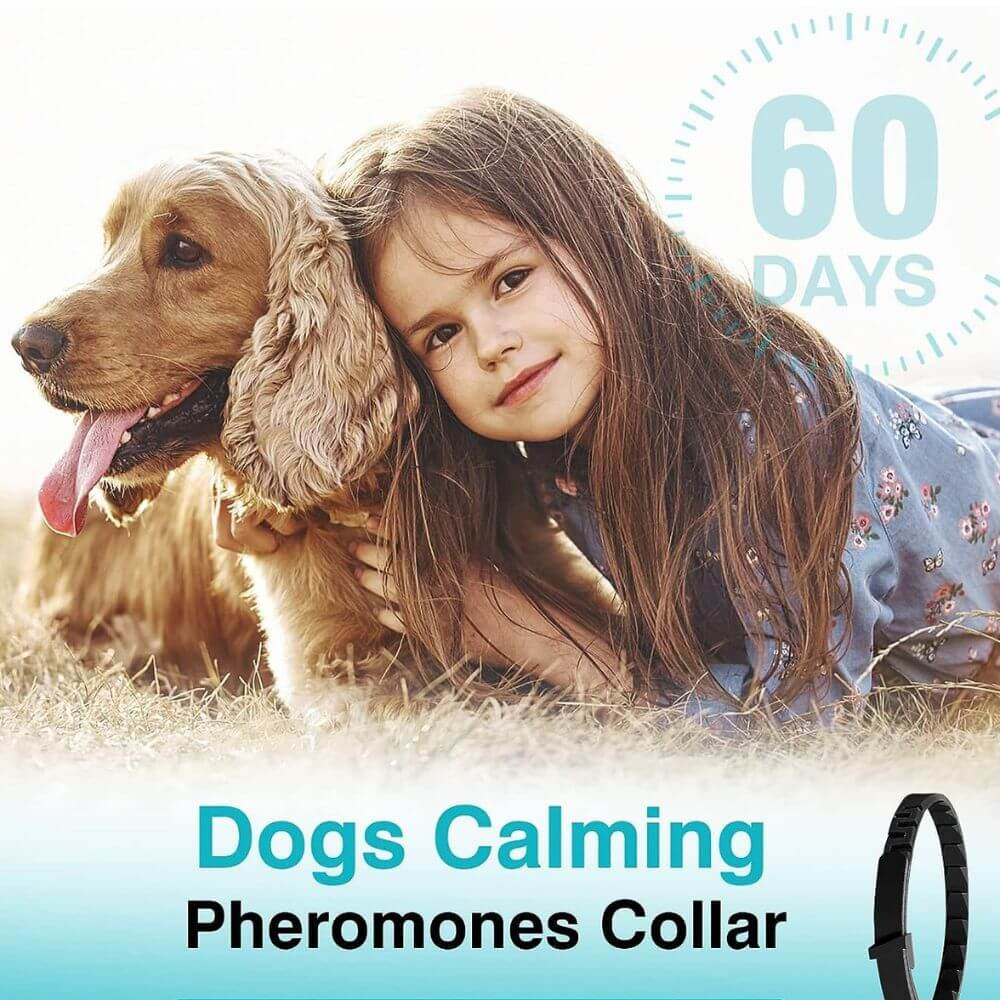
There are three main types of calming collars available for anxious dogs: pheromone-based collars, essential oil-based collars, and combination collars. Each type of collar has its unique benefits and levels of effectiveness in managing dog anxiety.
While pheromone-based collars are the most common and have been proven to reduce anxiety in dogs, essential oil-based collars may also provide relief for some dogs, albeit with less scientific evidence supporting their effectiveness.
Combination collars, on the other hand, use both pheromones and essential oils for a potentially more potent calming effect.
Pheromone-Based Collars
Pheromone-based collars are the most popular choice among pet owners and have been demonstrated to be effective in reducing anxiety in dogs. These collars release synthetic versions of the calming pheromones produced by mother dogs, which can help dogs feel more relaxed and content in stressful situations.
Studies indicate that pheromone-based collars like the Adaptil can significantly enhance dog behavior in a variety of anxiety-inducing situations, including thunderstorms and veterinary visits.
However, keep in mind that these collars’ effectiveness can differ based on the dog’s unique temperament and the precise source of their anxiety.
Essential Oil-Based Collars
Essential oil-based collars, while less scientifically proven than their pheromone-based counterparts, can still provide some relief for anxious dogs. These collars utilize the calming properties of essential oils, such as lavender and chamomile, to help reduce anxiety levels in dogs.
Though less scientific support exists for the efficacy of essential oil-based calming collars, numerous pet owners report favorable outcomes when utilizing these collars to control their dog’s anxiety.
Combination Collars
As the name implies, combination collars leverage both pheromones and essential oils to amplify potential calming effects for dogs. While these collars may offer additional benefits compared to pheromone-based or essential oil-based collars alone, some owners prefer to avoid them due to potential risks and a lack of scientific evidence for their effectiveness.
In the end, your dog’s unique needs and your personal preferences will dictate the choice of calming collar.
Situations Where Calming Collars May Help
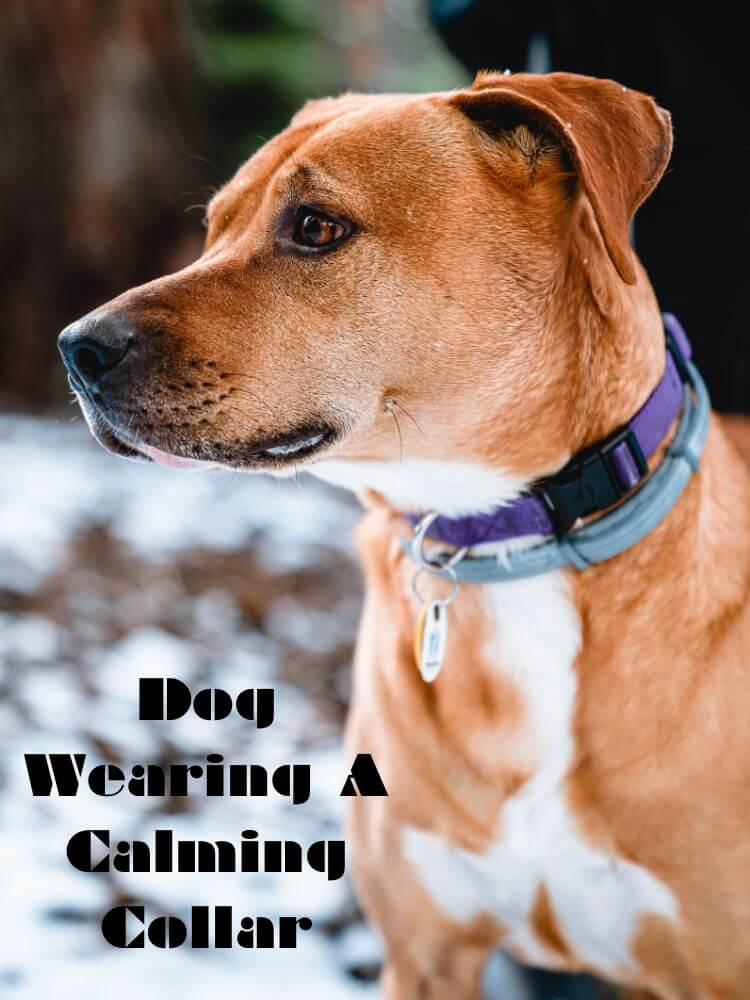
Calming collars can be beneficial for dogs in a variety of situations, such as:
- Separation anxiety
- Situational anxiety
- Social isolation
- Adjusting to new environments
A dog calming collar helps improve dog behavior by reducing anxiety and stress, making them a valuable tool for addressing a wide range of issues. For example, a dog with separation anxiety may benefit from wearing a calming collar when left alone, while a dog experiencing situational anxiety due to loud noises or travel may find relief with the help of a calming collar.
Bear in mind that calming collars might not be effective for all dogs or in every situation, given that individual responses can differ. In some cases, alternative solutions such as:
- diffusers
- sprays
- behavioral therapy
- prescribed medications
May be more effective in addressing a dog’s anxiety and dog anxious behavior by understanding the dog’s behavior.
Expert Opinions on Calming Collars
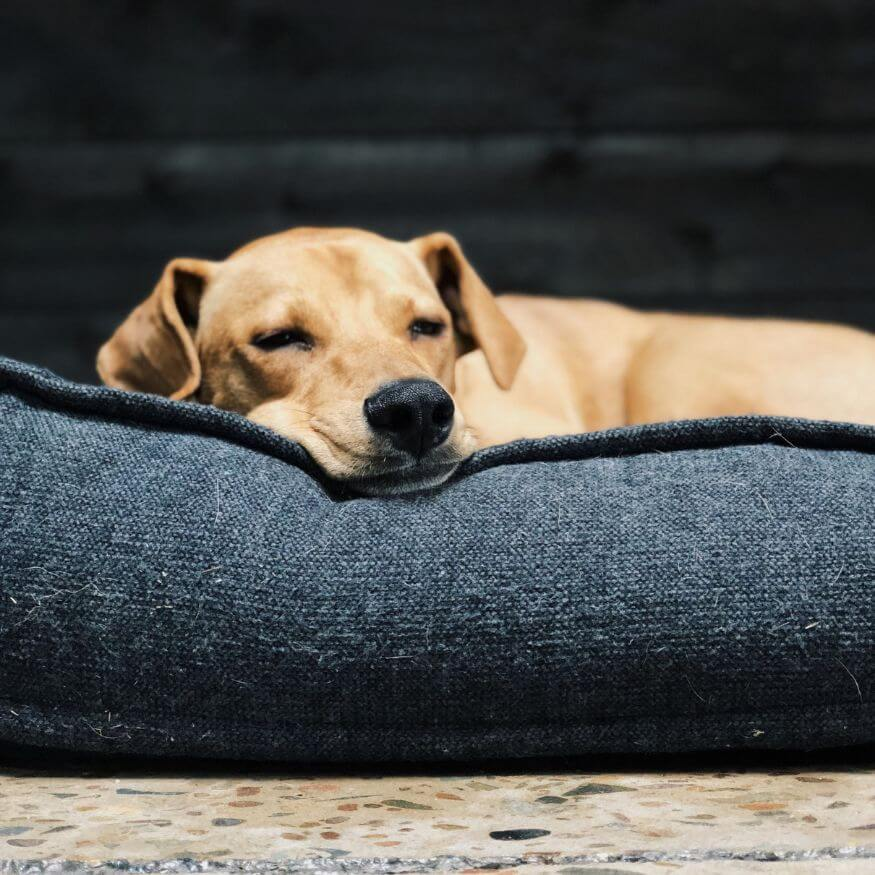
Experts in the field of veterinary medicine and animal behavior are cautiously optimistic about the use of calming collars for managing dog anxiety. While some research has shown promising results for the effectiveness of calming collars in reducing anxiety, experts recognize that calming collars work may not be universally effective for all dogs or in all situations.
Each dog’s distinctive needs must be taken into account when choosing a calming collar, as a solution that suits one dog might not work for another. In some cases, alternative methods such as behavior modification techniques or medication may be more effective in addressing anxiety and stress in dogs.
Consulting with a veterinarian or animal behaviorist is always recommended before using calming collars or any other anxiety-relief products for dogs.
How to Choose and Use a Calming Collar
Selecting the suitable calming collar for your dog involves evaluating elements like their breed, size, and particular anxiety problems. It’s always a good idea to consult with your veterinarian for guidance on selecting the most suitable collar for your pup.
Having chosen the appropriate dog collars, it’s vital to guarantee a correct fit and proper use for your dog’s comfort and safety.
Selecting the Right Collar
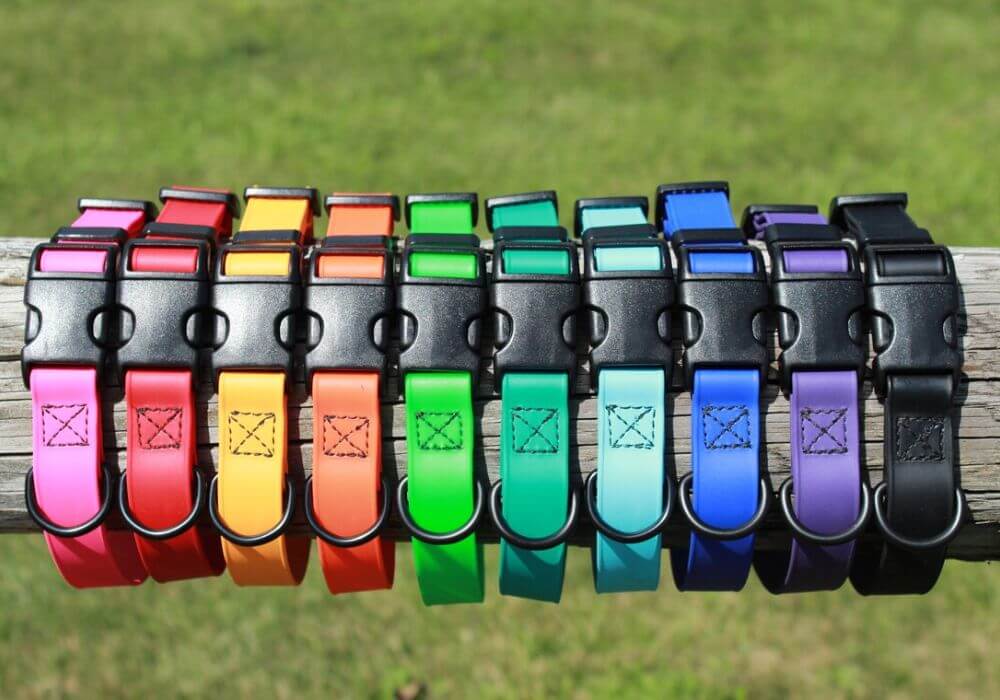
In choosing a calming collar, taking into account factors like your dog’s breed, size, and specific anxiety problems is necessary to guarantee the most favorable results. Different collars may be more suitable for certain breeds or sizes of dogs, and some may be more effective for addressing specific anxiety-related issues. For example, the Adaptil Calming Collar, Sentry HC Good Behavior Pheromone Dog Calming Collar, and ThunderWorks ThunderEase Calming Collar are all excellent choices for large breed dogs.
For small dogs, calming dog collars and other calming collars such as:
may be more appropriate. In the end, your dog’s unique needs and your personal preferences will dictate the choice of calming collar.
Proper Usage and Fit
To guarantee the correct fit of a calming collar, it’s vital to accurately measure your dog’s neck with a soft tape measure or a ruler. The collar should be snug but not too tight, allowing for a comfortable and secure fit. Most calming collars are adjustable, making it easy to find the perfect fit for your dog.
It’s also important to remember that calming collars should be used in conjunction with a regular collar or harness, not as a replacement. This will ensure that your dog remains comfortable and safe while wearing the calming collar.
Alternative Solutions for Dog Anxiety

Calming collars are just one tool in the arsenal of potential solutions for dog anxiety. Other options include:
- Diffusers
- Sprays
- Behavioral therapy
- Prescribed medications
Diffusers and sprays can provide a calming environment for your dog, while behavioral therapy can address the root causes of anxiety and help manage anxiety-related behaviors.
In more severe cases, prescribed medications may be necessary to help manage your dog’s anxiety effectively. It’s important to explore all potential solutions for your dog’s anxiety and consult with a veterinarian or animal behaviorist to determine the best approach for addressing your dog’s specific needs.
Real-Life Experiences with Calming Collars
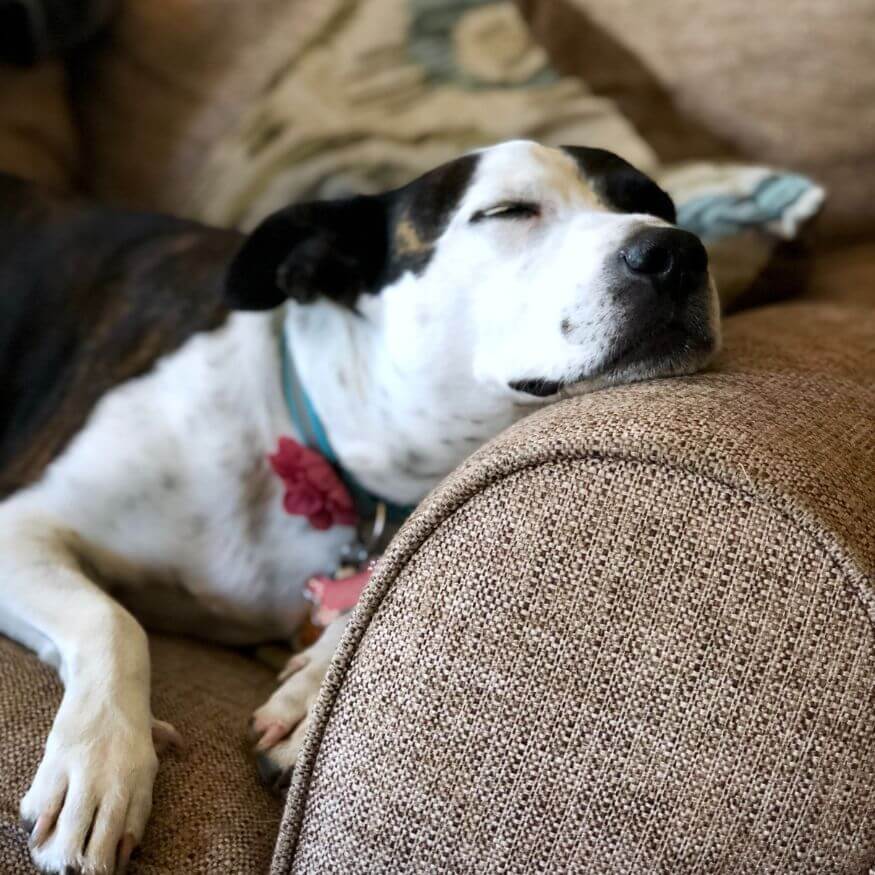
Real-life experiences with calming collars can vary greatly, with some pet owners reporting success while others see little to no improvement in their dog’s anxiety. For example, a dog owner used a calming pheromone collar on their reactive dog, and it helped reduce the dog’s anxiety and significantly improve their behavior. Another success story involves a dog with extreme separation anxiety who used a calming collar, along with other calming aids, to alleviate their anxiety and improve their overall well-being.
However, it’s crucial to remember that not all dogs may respond to calming collars, as individual reactions can vary. In some cases, alternative solutions such as:
- diffusers
- sprays
- behavioral therapy
- prescribed medications
may be more effective in addressing dog anxiety.
Summary
In conclusion, calming collars offer a promising solution for managing dog anxiety, with varying levels of effectiveness depending on the individual dog and their specific needs. By understanding the science behind calming collars, exploring the various types available, and learning how to choose and use them correctly, you can help your furry friend find relief from anxiety and live a happier, more relaxed life. Remember, it’s always best to consult with a veterinarian or animal behaviorist before trying any anxiety-relief product to ensure the best possible outcome for your beloved pet.
Frequently Asked Questions
Do dogs calming collars work?
Yes, calming collars can work for dogs. While they don't appear to be effective for all dogs, it is worth trying out to see if they help relieve your pet's anxiety and stress.
How long should a dog wear a calming collar?
A calming collar should be replaced every 4 weeks for maximum effectiveness, lasting up to 30 days. You may begin to see results within 7 days after wearing the collar.
What is the vet recommended calming collar?
The vet-recommended calming collar for your pup is ThunderEase, which uses pheromones to create a bond between dogs and help reduce unwanted behaviors. It's a drug-free solution that can help keep your pup relaxed in stressful situations.
How long does it take for calming collars to work?
Calming collars start working in as little as 1 hour, and may take up to a week to be fully effective. They provide excellent long-term support with pheromone delivery for up to 30 days.
Do calming collars work for all dogs?
Calming collars can be an effective solution for many dogs, although individual responses will vary. It's important to explore all available options with a veterinarian or behaviorist to determine the best approach for your dog.




